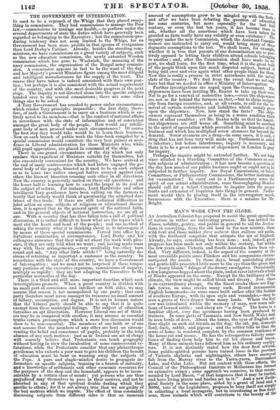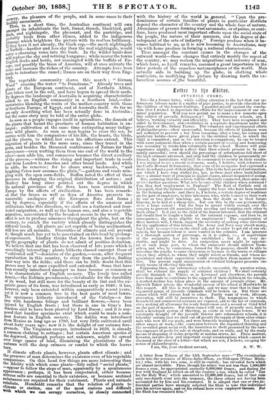MAN'S WORK UPON THE GLOBE.
AN Australian Colonist has proposed to assist the great operations of nature in rather an interesting process. He has invited the Times, nobility, gentry, and public in general to aid the Austra- lians in conveying, from the old land to the new country, those wild fowl and those milder farce nature that enliven our parks, with the feathered songsters that animate the air of England. Already, he says, something has been done ; and, indeed, great progress has been made not only within the century, but within the few years since Victoria and South Australia have been set- tled. Very different, indeed, is the aspect of the country at the most accessible points since Flinders and his companions circum- navigated the coasts. In those days, broad undulating plains and gentle hills presented little more to the eye than the grass, and the "hoary bluish" foliage of the dreary eucalyptus. Occasionally a few kangaroos hopped about the plain, and at rarer intervals aband of Blacks appeared on the scene. Except for the brilliancy of the climate, the view might be called bleak and dreary,. Now, there is an extraordinary change. On the finest creeks there are Eng- lish towns, on some creeks many such. Round innumerable English homesteads—in some cases built rather after the fashion of southern Europe, with its open style and verandahs,—may be seen a grove of trees drawn from many lands. Where the first cow was introduced within the memory of man, now roam lions of horned cattle ; and sheep are "a drug." The horse is a familiar object, very fine specimens having been produced by trainers. In some parts of Tasmania and New South Wales may be seen herds of deer. About the towns, the eyes of English set- tiers alight on such old friends as the dog, the cat, pig, domestic fowl, duck, rabbit, and pigeon ; and the settler tells us that the sense of home is rendered complete by the common residence of the house rat and mouse. He has the retrospective felicity some- times of finding them help him to eat his cheese and baco.a. Many of these animals have followed him as his ordinary coad..M- tors. It is not distinctly stated how the deer first ninv.ed. Some public-spirited persons have turned loose in the province of Victoria skylarks and nightingales, others have conveyed fish from the Murray river to the Yarra-yarra, Burrambeet Lake, and Colac Lake. But not content with these efforts, the Council of the Philosophical Institute at Melbourne has formed an extensive aviary ; some approach we conceive, to that recom- mended by Lord Bacon, "of that largeness that it may be turfed, and have living plants and bushes set in it." And a new Zoolo- gical Society in the same place, aided by a grant of land FA a 3000/. vote of the Legislature, proposes to busy itself not simply in collecting a local menagerie, but in introducing as free deni- zens, those animals which will contribute to the beauty of the scenery, the pleasure of the people, and in some cases to their healthy ainusement.
Thus, in a short time, the Australian continent will own -+ its inhabitants the lark, linnet, thrush, blackbird, gold araone e.-
inch, and nightingale, the pheasant, and the partridge, and irobably birds from other climes, added to the indigenous ;bump which brightens the picture with its restless brilliancy. If they have it not already, the black cap,—the mock nightingale of Norfolk—hardier and less shy than the real nightingale, would carry a charming voice into the bush. In the wilder lands deer replace the shy and retiring kangaroo ; while nearer the towns English flocks and herds, not unmingled with the buffalo of Eu- rope, and possibly the bison of America, will at once animate the scene and increase the riches of the country. Attempts have been made to introduce the camel ; llamas are on their way from Eng- land. The vegetable community shares this march ; " Birnam Wood" crossing the water "to Dunsinane." Already trees and plants of the European continent, and of Northern Africa, have taken root in the soil, and have begun to spread their seeds. Ey degrees the landscape of Australia is acquiring characteristics suited to an English community in a Southern land,—cha- racteristics blending the traits of the mother-country with those of Southern Europe, of Egypt, and of Australia itself. So far we are only describing what has been actually done in Australia ; but the same story may be told of the entire globe. As soon as a people engages itself in agriculture, the domain of the plants that haunt the precincts of human habitation is en- larged; cultivation at the same time extirpating many indige- nous wild plants. As soon as man begins to cross the sea, he carries with him the companions of his life the beasts, the birds, and the plants, to which last even his affections extend. This migration of plants is the more easy, since they travel in the germ, and besides the thousand contrivances of Nature for their conveyance—even wafting them from one end of the world to the other—man adds his, and commerce becomes the direct auxiliary of the process,—witness the rising and important trade in seeds sent from London to America and other broad lands. And while be adds, he removes ; for he clears away backwoods, "and laughing Ceres now assumes the plain,"—gardens and roads min- gling with the open corn-fields. Buffon noted the effect of these processes in changing the original distribution of nature ; and lffenfrey has long since pointed out the degree in which the natural provinces of the flora have been overridden in Europe by the effects of civilization. It has been remark- ed that the fauna as well as flora of America presents in- numerable analogues of the European flora and fauna ; but by degrees, especially if the eftbrts of the amateur and utilitarians take this direction, we shall see a feathered and four- footed emigration, as well as the human one, and also a vegetable migration, unrestricted by the broadest oceans in the world. The effect is not to produce sameness throughout the globe but on the contrary, to enrich the variety which already distinguishes the different lands. All plants are not capable of being acclimatised, still less are all animals. Diversities of climate and soil prevent it; though much has yet to be ascertained on this head by prolong- ed experiment. Lindley thinks that the known facts respect- ing the geography of plants do not admit of positive deduction. We believe that one fact has been observed of late years which is exceedingly interesting : plants hitherto classed amongst those of "cultivated soil "—denizens of the garden,—seem, after frequent reproduction in this country, to stray from the garden, finding their way into the fields; and there can be little doubt that this puss may be at once expedited and extended. Some that have been recently introduced amongst us have become so common as to be characteristic of English scenery. The lovely tree called Acacia,—the Robinia pseudacacia —invaluable for the durability of its wood, but still more for the beauty of its tint and the ex- quisite grace of its form was introduced as early as 1640; it has, however, only been extended within comparatively recent years ; yet it is now a common tree in the best parts of most towns. The specimens hitherto introduced of the Catalpa—a fine tree with handsome foliage and brilliant flowers,—have been injured by English frosts ; but there is one in Gray's Inn Gardens said to have been planted by Lord Bacon ; and it is sup- Posed that hardier specimens exist which could be made a com- mon feature in English scenery. The dahlia was introduced from Mexico as long ago as 1789, but very little cultivated until about forty years ago : now it is the delight of our autumn fore- grounds. The Virginian creeper, introduced in 1629, is already a common clothing to cottages ; but certain American species of e dogwood, although perhaps not unknown, might be spread over large spaces of land, illumining the plantations of the !akin= with the deep crimson or scarlet to which the leaves If climate affects plants, however, plants affect climate ; and the presence of man determines the existence even of his vegetable companions. On this head few things are more interesting than the fidelity with which some plants—fitly called " social plants," —Wear to follow the steps of man, apparently by a spontaneous appearance ; perhaps, it has been conjectured, either because introits salts are essential to their existence' or because azotized substances are required for their nutriment. Plants and animals retaliate. Humboldt remarks that the relation of plants to eli.inate or station, one of the most curious and difficult winch we can occupy ourselves, i closely connected , the Shah has remained firm."
with the history of the world in general. "Upon the pre- dominance of certain families of plants in particular districts depend the character of the country and the whole face of nature. Abundance of grasses forming vast savannahs, or of palms, or coni- ferse, have produced most important effects upon the social state of the people, the nature of their manners, and the degree of de- velopment of the arts of industry." Foreign produce when it be- comes habitual to us, as it is now becoming to Australians, may vie with home produce in forming a national characteristic. Thus amongst the constant causes in the changes of the outward world—those changes that entirely modify the aspect of the country, we may reckon the migrations and industry of man, which have, as Lyell remarks, assumed a great importance in the later periods of the ceaseless metamorphoses of the world. Man actually aids in building up the globe, in clothing whole continents, in modifying the picture by drawing forth the ex- haustless sources of the beautiful.



























 Previous page
Previous page